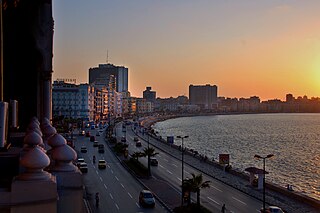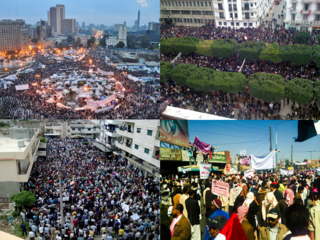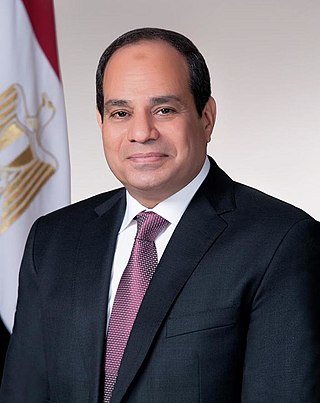
Ancient Egypt was a civilization in Northeast Africa situated in the Nile Valley. Ancient Egyptian civilization followed prehistoric Egypt and coalesced around 3100 BC with the political unification of Upper and Lower Egypt under Menes. The history of ancient Egypt occurred as a series of stable kingdoms, separated by periods of relative instability known as Intermediate Periods: the Old Kingdom of the Early Bronze Age, the Middle Kingdom of the Middle Bronze Age and the New Kingdom of the Late Bronze Age.

Alexandria is the second largest city in Egypt, and the largest city on the Mediterranean coast. Founded in c. 331 BC by Alexander the Great, Alexandria grew rapidly and became a major centre of Hellenic civilization, eventually replacing Memphis, in present-day Greater Cairo, as Egypt's capital. Called the "Bride of the Mediterranean" internationally, Alexandria is a popular tourist destination and an important industrial centre due to its natural gas and oil pipelines from Suez.

Cairo is the capital of Egypt and the city-state Cairo Governorate, and is the country's largest city, home to 10 million people. It is also part of the largest urban agglomeration in Africa, the Arab world and the Middle East: The Greater Cairo metropolitan area, with a population of 22.1 million, is the 12th-largest in the world by population. Cairo is associated with ancient Egypt, as the Giza pyramid complex and the ancient cities of Memphis and Heliopolis are located in its geographical area. Located near the Nile Delta, the city first developed as Fustat following the Muslim conquest of Egypt in 641 next to an existing ancient Roman fortress, Babylon. Cairo was founded by the Fatimid dynasty in 969. It later superseded Fustat as the main urban centre during the Ayyubid and Mamluk periods. Cairo has long been a centre of the region's political and cultural life, and is titled "the city of a thousand minarets" for its preponderance of Islamic architecture. Cairo's historic center was awarded World Heritage Site status in 1979. Cairo is considered a World City with a "Beta +" classification according to GaWC.

The Middle East is a geopolitical region encompassing the Arabian Peninsula, the Levant, Turkey, Egypt, Iran, and Iraq. The term came into widespread usage as a replacement of the term Near East beginning in the early 20th century. The term "Middle East" has led to some confusion over its changing definitions, and being seen as too Eurocentric. The region includes the vast majority of the territories included in the closely associated definition of West Asia, but without the South Caucasus, and additionally includes all of Egypt and all of Turkey.

The Six-Day War or June War, also known as the 1967 Arab–Israeli War or Third Arab–Israeli War, was fought between Israel and a coalition of Arab states from 5 to 10 June 1967.

Muhammad Anwar el-Sadat was an Egyptian politician and military officer who served as the third president of Egypt, from 15 October 1970 until his assassination by fundamentalist army officers on 6 October 1981. Sadat was a senior member of the Free Officers who overthrew King Farouk in the Egyptian Revolution of 1952, and a close confidant of President Gamal Abdel Nasser, under whom he served as Vice President twice and whom he succeeded as president in 1970. In 1978, Sadat and Menachem Begin, Prime Minister of Israel, signed a peace treaty in cooperation with United States President Jimmy Carter, for which they were recognized with the Nobel Peace Prize.

The Suez Crisis, or the Second Arab–Israeli war, also called the Tripartite Aggression in the Arab world and the Sinai War in Israel, was an invasion of Egypt and the Gaza Strip in late 1956 by Israel, followed by the United Kingdom and France. The aims were to regain control of the Suez Canal for the Western powers and to remove Egyptian president Gamal Abdel Nasser, who had just nationalised the foreign-owned Suez Canal Company, which administered the canal. Israel's primary objective was to re-open the blocked Straits of Tiran. After the fighting had started, political pressure from the United States, the Soviet Union, and the United Nations led to a withdrawal by the three invaders. The episode humiliated the United Kingdom and France and strengthened Nasser.

Thutmose III, sometimes called Thutmose the Great, was the sixth pharaoh of the 18th Dynasty. Officially, Thutmose III ruled Egypt for almost 54 years and his reign is usually dated from 28 April 1479 BC to 11 March 1425 BC, from the age of two and until his death at age fifty-six; however, during the first 22 years of his reign, he was coregent with his stepmother and aunt, Hatshepsut, who was named the pharaoh. While he was shown first on surviving monuments, both were assigned the usual royal names and insignia and neither is given any obvious seniority over the other. Thutmose served as the head of Hatshepsut's armies. During the final two years of his reign, he appointed his son and successor, Amenhotep II, as his junior co-regent. His firstborn son and heir to the throne, Amenemhat, predeceased Thutmose III.

Copts are a Christian ethnoreligious group indigenous to North Africa who have primarily inhabited the area of modern Egypt and Sudan since antiquity. Most ethnic Copts are Coptic Oriental Orthodox Christians. They are the largest Christian denomination in Egypt and the Middle East, as well as in Sudan and Libya. Copts have historically spoken the Coptic language, a direct descendant of the Demotic Egyptian that was spoken in late antiquity.

The Nile Delta is the delta formed in Lower Egypt where the Nile River spreads out and drains into the Mediterranean Sea. It is one of the world's largest river deltas—from Alexandria in the west to Port Said in the east, it covers 240 km (150 mi) of Mediterranean coastline and is a rich agricultural region. From north to south the delta is approximately 160 km (100 mi) in length. The Delta begins slightly down-river from Cairo.

The New Kingdom, also referred to as the Egyptian Empire, was the ancient Egyptian nation between the 16th century BC and the 11th century BC. This period of ancient Egyptian history covers the Eighteenth Dynasty, the Nineteenth Dynasty, and the Twentieth Dynasty. Through radiocarbon dating, the establishment of the New Kingdom has been placed between 1570 BC and 1544 BC. The New Kingdom followed the Second Intermediate Period and was succeeded by the Third Intermediate Period. It was the most prosperous time for the Egyptian people and marked the peak of Egypt's power.

Eastern European Time (EET) is one of the names of UTC+02:00 time zone, 2 hours ahead of Coordinated Universal Time. The zone uses daylight saving time, so that it uses UTC+03:00 during the summer.

The Middle East and North Africa is a geographic region whose countries are often referred to by the acronym MENA. It is also known as WANA, SWANA, or NAWA, which alternatively refers to the Middle East as West Asia or as Southwest Asia; this is another way to reference the geographical region, instead of using the more common political terminology.

Egypt, officially the Arab Republic of Egypt, is a transcontinental country spanning the northeast corner of Africa and the Sinai Peninsula in the southwest corner of Asia. It is bordered by the Mediterranean Sea to the north, the Gaza Strip of Palestine and Israel to the northeast, the Red Sea to the east, Sudan to the south, and Libya to the west. The Gulf of Aqaba in the northeast separates Egypt from Jordan and Saudi Arabia. Cairo is the capital and largest city of Egypt, while Alexandria, the second-largest city, is an important industrial and tourist hub at the Mediterranean coast. At approximately 100 million inhabitants, Egypt is the 14th-most populated country in the world, and the third-most populated in Africa, behind Nigeria and Ethiopia.

Egypt and the United States formally began relations in 1922 after Egypt gained nominal independence from the United Kingdom. Relations between both countries have largely been dictated by regional issues in the Middle East such as the Israeli–Palestinian conflict and Counterterrorism. But also domestic issues in Egypt regarding the country's human rights record and American support for the regimes of Hosni Mubarak and Abdel Fattah el-Sisi which the United States had come under controversy for in the aftermath of the 2011 Egyptian Revolution, and with many dissents of the current regime describing Sisi's rule as tyrannical.

Ramesses II, commonly known as Ramesses the Great, was an Egyptian pharaoh. He was the third ruler of the Nineteenth Dynasty. Along with Thutmose III of the Eighteenth Dynasty, he is often regarded as the greatest, most celebrated, and most powerful pharaoh of the New Kingdom, which itself was the most powerful period of ancient Egypt. He is also widely considered one of ancient Egypt's most successful warrior pharaohs, conducting no fewer than 15 military campaigns, all resulting in victories, excluding the Battle of Kadesh, generally considered a stalemate.
The Episcopal/Anglican Province of Alexandria is a province of the Anglican Communion. Its territory was formerly the Diocese of Egypt with North Africa and the Horn of Africa. On 29 June 2020 the diocese was elevated to the status of an ecclesiastical province, and became the forty-first province of the Anglican Communion. The primate and metropolitan of the province is the Archbishop of Alexandria.

The Arab Spring or the First Arab Spring was a series of anti-government protests, uprisings and armed rebellions that spread across much of the Arab world in the early 2010s. It began in Tunisia in response to corruption and economic stagnation. From Tunisia, the protests then spread to five other countries: Libya, Egypt, Yemen, Syria and Bahrain. Rulers were deposed or major uprisings and social violence occurred including riots, civil wars, or insurgencies. Sustained street demonstrations took place in Morocco, Iraq, Algeria, Lebanon, Jordan, Kuwait, Oman and Sudan. Minor protests took place in Djibouti, Mauritania, Palestine, Saudi Arabia and the Moroccan-occupied Western Sahara. A major slogan of the demonstrators in the Arab world is ash-shaʻb yurīd isqāṭ an-niẓām!.

Mohamed Salah Hamed Mahrous Ghaly, known as Mohamed Salah or Mo Salah, is an Egyptian professional footballer who plays as a right winger or forward for Premier League club Liverpool and captains the Egypt national team. Considered one of the best players of his generation and amongst the greatest African players of all time, he is known for his clinical finishing, dribbling and speed.

Abdel Fattah Saeed Hussein Khalil el-Sisi is an Egyptian politician and retired military officer who has served as the sixth and current president of Egypt since 2014. Before retiring as a general in the Egyptian military in 2014, Sisi served as Egypt’s deputy prime minister from 2013 to 2014, as its minister of defense from 2012 to 2013, and as its director of military intelligence from 2010 to 2012. He was promoted to the rank of Field Marshal in January 2014.


















